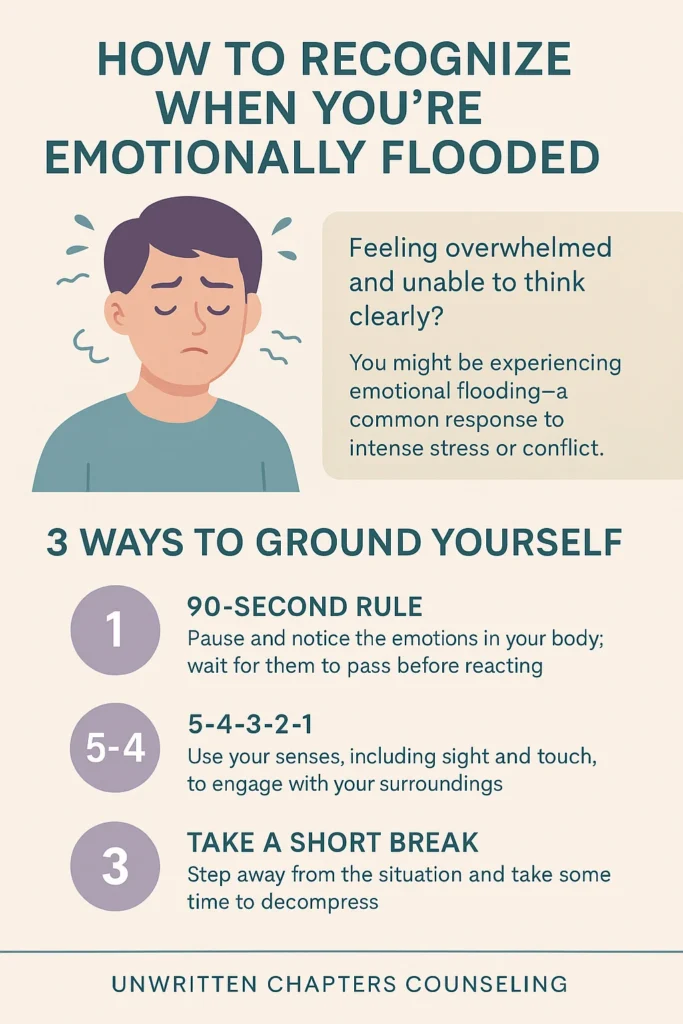What is Emotional Flooding?
Emotional flooding is a psychological phenomenon that occurs when an individual experiences overwhelming emotions that can lead to a sense of losing control. This intense emotional experience can be triggered by various factors, including stress, anxiety, and traumatic memories. During emotional flooding, the brain’s ability to process information becomes compromised, often resulting in a heightened state of reaction rather than rational thought. Understanding emotional flooding is imperative for managing one’s emotional well-being, as it can significantly impact relationships and personal health.
When someone is emotionally flooded, they may feel a surge of emotions such as anger, fear, sadness, or confusion. These feelings can arise suddenly and may feel disproportionate to the situation at hand. The intensity of the emotions can hinder effective communication and problem-solving, leaving individuals feeling trapped in their own emotional responses. Recognizing when emotional flooding is occurring is the first step toward regaining control and fostering a healthier emotional environment.
Causes of Emotional Flooding
Stressful Life Events
Life is filled with stressful events that can trigger emotional flooding. Major life changes such as the loss of a loved one, job loss, or relationship breakdown can evoke overwhelming feelings. These events often act as catalysts for feelings of grief, anxiety, and despair, which can culminate in emotional flooding. It’s essential to acknowledge that everyone reacts differently to stress; what may be a minor inconvenience for one person could be a significant challenge for another.
Moreover, the accumulation of daily stressors can lead to emotional flooding as well. Small, seemingly insignificant stressors can build up over time, resulting in a tipping point where the individual is unable to cope. This phenomenon is often referred to as “death by a thousand cuts,” where the cumulative effect of stressors leads to emotional overwhelm.
Traumatic Experiences
Trauma is a significant trigger for emotional flooding. Individuals who have experienced traumatic events, whether physical, emotional, or psychological, may find themselves frequently revisiting those memories under stress. Traumatic experiences can create a lasting impact on the psyche, leading to heightened sensitivity to triggers associated with that trauma. As a result, when faced with stimuli that remind them of their trauma, these individuals may experience floods of intense emotions.
Understanding the link between trauma and emotional flooding is crucial for both those who suffer from it and their loved ones. Recognizing triggers and developing coping strategies can help reduce the frequency and intensity of emotional flooding related to trauma.
Chronic Stressors
Ongoing stressors, such as financial difficulties, health issues, and relationship conflicts, can lead to a condition known as chronic stress. Chronic stress impairs the body’s ability to respond effectively to challenges, creating a situation where an individual is more vulnerable to emotional flooding. Over time, the continuous pressure from chronic stress can overwhelm an individual, making it difficult to handle even minor stressors without experiencing emotional flooding.
Implementing stress management techniques is essential for those dealing with chronic stress. By addressing persistent stressors and finding ways to mitigate them, individuals can reduce the likelihood of emotional flooding and improve their emotional resilience.
Signs and Symptoms
Physical Reactions
When experiencing emotional flooding, individuals may exhibit notable physical reactions. These can include rapid heart rate, sweating, trembling, and muscle tension. The body’s stress response can also lead to gastrointestinal issues, headaches, and fatigue. Recognizing these physical symptoms is crucial, as they are often the first indicators that an individual is becoming overwhelmed.
These physical manifestations of emotional flooding can vary greatly from person to person. Some may experience more pronounced physical responses, while others may internalize their feelings, resulting in more subtle physical signs. Listening to one’s body is an essential part of recognizing emotional flooding.
Emotional Responses
Emotional flooding can lead to a range of emotional responses that can be both intense and confusing. Individuals may experience feelings of anger, sadness, or anxiety that seem to come out of nowhere. During these episodes, rational thought may become clouded, making it difficult to engage in constructive communication or problem-solving.
People may also find themselves feeling overwhelmed by the sheer weight of their emotions, leading to withdrawal from social interactions or conflict avoidance. Recognizing these emotional responses is crucial for individuals and their loved ones, as it allows for better support and understanding during difficult times.
Cognitive Impact
The cognitive impact of emotional flooding can be significant. Individuals may experience an inability to think clearly or make decisions. This cognitive disruption can lead to difficulties in concentrating and processing information. The overwhelming nature of the emotions can create a foggy mental state, where clarity and rationality are compromised.
Additionally, emotional flooding can lead to negative thinking patterns and increased self-doubt. It may be challenging for individuals to engage in positive self-talk or maintain a balanced perspective when they are in a heightened emotional state. Recognizing this cognitive distortion can be the first step toward managing emotional responses more effectively.
The Fight, Flight, or Freeze Response
Understanding the Response Mechanism
The fight, flight, or freeze response is an instinctual reaction rooted in our evolutionary history. This response mechanism is activated during times of perceived danger, allowing individuals to react quickly to threats. When emotional flooding occurs, this response can dramatically intensify feelings of overwhelm and panic. Essentially, the brain perceives emotional stress as a threat, triggering the release of stress hormones like adrenaline and cortisol.
This physiological response can lead to a variety of emotional reactions, including aggression (fight), avoidance (flight), or numbness (freeze). Understanding how the body responds to overwhelming emotions can help individuals better manage their emotional states and recognize the signs of emotional flooding before they escalate.
How It Relates to Emotional Flooding
The link between the fight, flight, or freeze response and emotional flooding is significant. When individuals experience emotional flooding, they may find themselves reacting instinctively rather than thoughtfully. For example, during an emotional flooding episode, someone might lash out in anger (fight), withdraw from a situation (flight), or become completely immobilized (freeze).
By understanding this connection, individuals can develop strategies to break the cycle of emotional flooding. Recognizing the early signs of being triggered can empower individuals to implement coping mechanisms before the situation escalates into emotional flooding.
Strategies to Manage Emotional Flooding
3 Grounding Techniques to Use When You Notice Flooding
1️⃣ The 90-Second Rule
Neuroscience tells us that the body’s chemical response to strong emotion lasts about 90 seconds — unless we feed it with additional thoughts. Pause. Breathe deeply. Let the wave pass without adding fuel.
2️⃣ 5-4-3-2-1 Grounding
Identify:
-
5 things you can see
-
4 things you can touch
-
3 things you can hear
-
2 things you can smell
-
1 thing you can taste
This helps bring your mind back to the present and out of the emotional spiral.
3️⃣ Take a Short Break (But Commit to Returning)
If you’re in a heated discussion, it’s okay to call a timeout. Say something like, “I need a few minutes to cool down so I can really listen to you.” Step away, regulate your body, then return to the conversation when you’re calmer.
When to Seek Help
Recognizing the Need for Professional Support
While self-help strategies can be incredibly beneficial, there are times when emotional flooding may require professional support. Recognizing when to seek help is crucial for emotional well-being. If emotional flooding becomes frequent, affecting daily life, work, or relationships, it may be time to consult a mental health professional.
Additionally, if individuals find themselves unable to cope with their emotions, experiencing persistent feelings of hopelessness, or engaging in self-destructive behaviors, seeking professional guidance is essential. Mental health professionals can provide a safe space to explore these feelings and develop coping strategies tailored to individual needs.
Types of Therapy and Support Available
Various types of therapy can effectively address the challenges associated with emotional flooding. Cognitive Behavioral Therapy (CBT) focuses on identifying and reshaping negative thought patterns that contribute to emotional overwhelm. Dialectical Behavior Therapy (DBT) incorporates mindfulness and emotional regulation skills specifically designed for individuals facing intense emotions.
Support groups and workshops can also offer valuable resources for those struggling with emotional flooding. Connecting with others who share similar experiences can foster a sense of community, breaking the isolation that often accompanies overwhelming emotions. Whether through individual therapy or group support, accessing professional help can significantly enhance emotional resilience.
Conclusion
Embracing Emotional Awareness
Emotional flooding can be a challenging experience, but it is essential to understand that it is a natural response to overwhelming situations. Developing emotional awareness is key to managing these intense feelings. By recognizing triggers, understanding physical and emotional responses, and implementing coping strategies, individuals can regain control over their emotional states.
The Importance of Self-Compassion
In the journey of managing emotional flooding, self-compassion plays a vital role. It is essential to acknowledge that everyone experiences overwhelming emotions at times, and being kind to oneself during these moments can make a difference. Practicing self-compassion fosters resilience and promotes a healthier relationship with one’s emotions, ultimately leading to more balanced emotional well-being.
FAQs
What is the difference between emotional flooding and anxiety?
Emotional flooding refers to an overwhelming surge of emotions that can make it difficult to function, while anxiety is a more persistent feeling of unease or worry. Emotional flooding can be triggered by specific events or memories, whereas anxiety may be a chronic state that can fluctuate in intensity.
Can emotional flooding happen to anyone?
Yes, emotional flooding can happen to anyone, regardless of age or background. It is a common response to stress, trauma, or overwhelming situations. Recognizing the signs and learning coping mechanisms can help manage these experiences effectively.
Are there specific therapies recommended for emotional flooding?
Cognitive Behavioral Therapy (CBT) and Dialectical Behavior Therapy (DBT) are often recommended for managing emotional flooding. These therapies provide tools and techniques for recognizing triggers, reshaping thought patterns, and developing emotional regulation skills.
How can I help someone who experiences emotional flooding?
Supporting someone who experiences emotional flooding involves active listening, validating their feelings, and encouraging them to use coping strategies like grounding or breathing exercises. It’s important to create a safe space for them to express their emotions without judgment.
Is emotional flooding a sign of weakness?
No, emotional flooding is not a sign of weakness. It is a natural human response to overwhelming situations and emotions. Recognizing and addressing emotional flooding demonstrates strength and a commitment to emotional health.




